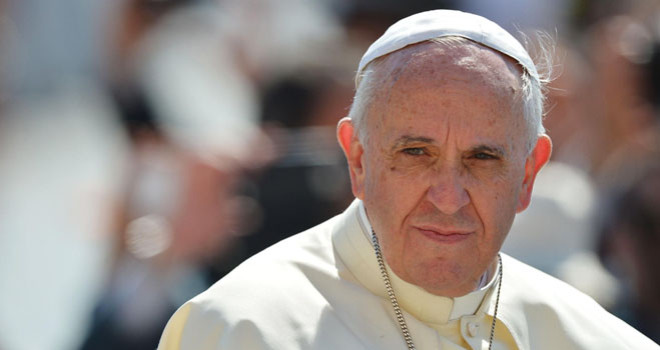Pope Francis urges United Nations to help in Venezuela crisis
Pope Francis was thinking about Venezuela throughout his visit to Colombia. As his plane took off for Bogota, Francis told journalists that they were going to fly over Venezuela and asked them “to pray so there can be dialogue, that there will be stability, with dialogue with everyone.”
In his Angelus address, Pope Francis again assured those present of his prayers for the countries of Latin America, particularly Venezuela, expressing his closeness to the nation and those of its citizens who have been welcomed into Colombia.
“From this city, known as the seat of human rights, I appeal for the rejection of all violence in political life and for a solution to the current grave crisis, which affects everyone, particularly the poorest and most disadvantaged of society,” he said.
During his visit to Columbia, Francis also met briefly with five Venezuelan bishops, whom he welcomed to the sacristy after celebrating Mass in Bogota. They were Cardinal Jorge Urosa, Archbishop of Caracas; Cardenal Baltazar Porras, Archbishop of Mérida; Jesús González de Zárate, Auxiliary Bishop of Caracas; Bishop Mario Moronta of San Cristóbal; and Bishop José Luis Azuaje of Barinas, who is also President of the Latin American branch of Cáritas.
On his return journey from Columbia, Pope Francis spoke about the appalling political and human rights crisis in Venezuela: “It seems that it’s a very hard thing, and the most painful are the humanitarian problem, the many people who escape or suffer…we must help to resolve it in any way possible. I think the U.N. must also make itself felt there to help.”
“I think that the Holy See has spoken strongly and clearly,” he added, also mentioning the many times he had previously spoken about the situation in Venezuela.
The Pope also mentioned the Holy See’s considerable work to promote dialogue in Venezuela, including the agreement to send a group of four ex-presidents as facilitators in a meeting between the Venezuelan government and the opposition in Oct 2016.
The group consisted of former Colombian president Ernesto Samper Pizano, the secretary general of UNASUR (the Union of South American Nations); Leonel Fernández of the Dominican Republic; Martín Torrijos of Panama and José Luis Rodríguez Zapatero of Spain. Archbishop Claudio Maria Celli also participated as a nuncio of the Holy See.
President Nicolás Maduro has suppressed opposition and democracy activists and moved to seize legislative power in Venezuela, triggering a wave of escalating protests and violence. The results of a July 30 election which Maduro convened were dismissed as illegitimate by the United States and several other nations. The burgeoning economic crisis has led to widespread chaos.
Venezuela’s Supreme Court has progressively dismantled the rule of law, becoming an instrument of President Nicolas Maduro’s government in what amounts to a coup against the constitutional order the International Commission of Jurists (ICJ), an international human rights group, said.
The collapse of the judiciary has left victims of torture, killings and disappearances and their families without recourse to justice after months of violent street protests, the International Commission of Jurists (ICJ) stated. It called on the U.N. Human Rights Council to take action.
ACN Malta





